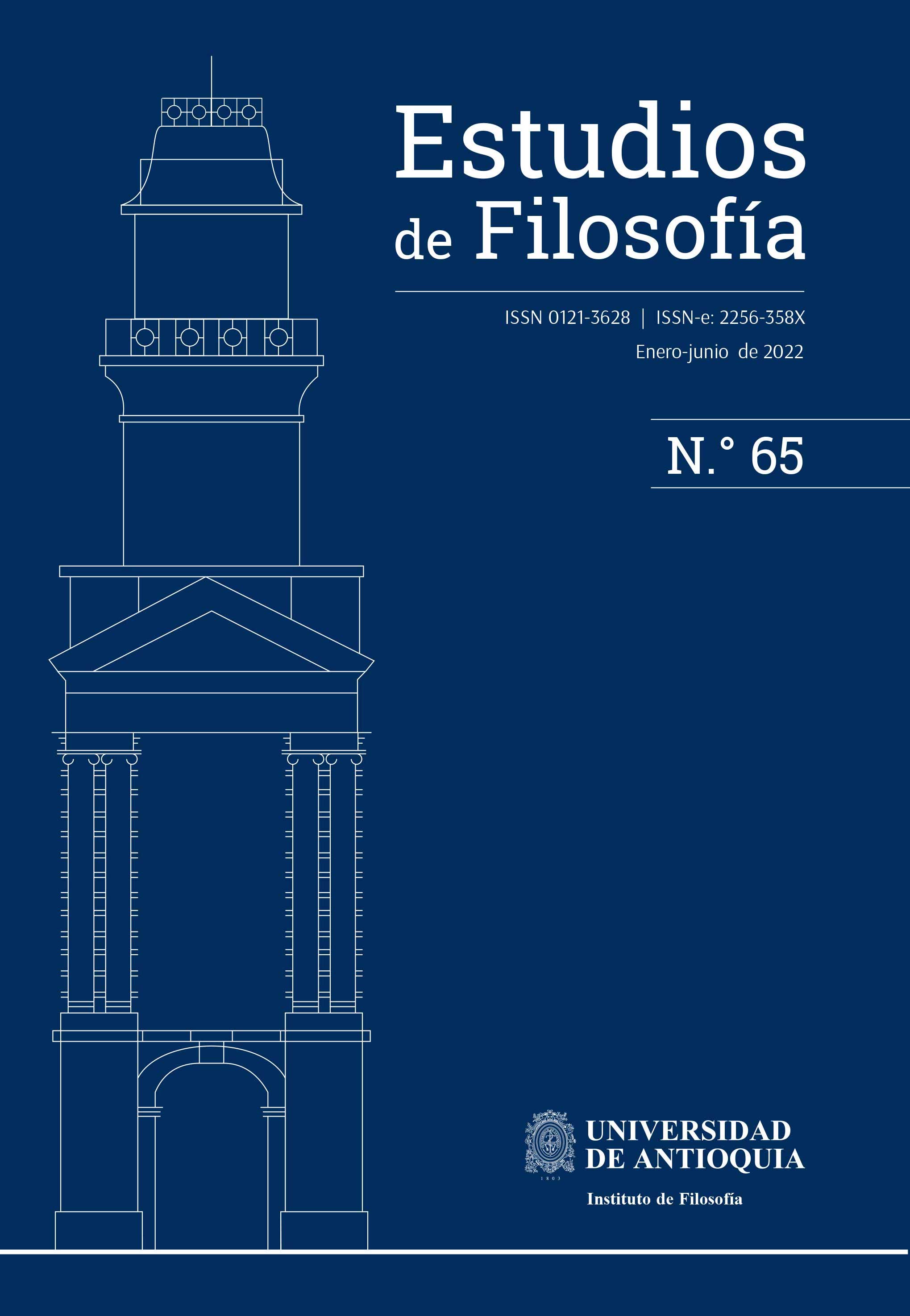El rol de la razón en el establecimiento de los fines prácticos. Un diálogo con algunas interpretaciones de Aristóteles
DOI:
https://doi.org/10.17533/udea.ef.345410Palabras clave:
Aristóteles, razón práctica, carácter, deseo, fantasía, intelectualismoResumen
Se ha desarrollado en la actualidad un debate acerca del rol de la razón en el establecimiento de los fines prácticos en la teoría aristotélica de la acción, dado que en algunos pasajes Aristóteles reserva al carácter el rol de establecer los fines y en otros confiere a la razón el rol de gobierno en el alma. ¿Cómo se pueden conciliar estos dos grupos de evidencia textual? En este artículo defenderé que estos dos grupos de evidencia explican dos fenómenos psicológicos diferentes. Para llegar a esta propuesta dialogaré con las interpretaciones principales y más recientes en este debate (intelectualismo, anti-intelectualismo e intelectualismo indirecto), mostrando cómo, si bien el carácter establece nuestras representaciones, deseos y acciones habituales, la razón puede cuestionar y oponerse a ellos, como se ve en los procesos de cambio de carácter
Descargas
Citas
Aristotle. (1884). Aristotelis ethica eudemia. F. Susemihl, (Ed.). Teubner.
Aristotle. (1924). Aristotle’s metaphysics. 2 vols. W. D. Ross (Ed.). Oxford University Press.
https://doi.org/10.1093/actrade/9780198847779.book.1
Aristotle. (1961). Aristotle. De anima. W. D. Ross (Ed.). Clarendon Press. https://doi.org/10.1093/ actrade/9780198141556.book.1
Aristotle. (1963a). Aristotle: politics. W. D. Ross (Ed.). Oxford University Press.
Aristotle. (1963b). Aristotle’s categories and De interpretatione (J. L. Ackrill, Trans.). Clarendon
Press.
Aristotle. (1984a). Politics. In J. Barnes (Ed.), The complete works of Aristotle (B. Jowett, Trans.). Oxford University Press.
Aristotle. (1984b). On the soul. In J. Barnes (Ed.), The complete works of Aristotle (J. A. Smith, Trans.). Oxford University Press.
Aristotle. (1984c). Aristotelis ethica nicomachea. I. Bywater (Ed.). Clarendon Press.
Aristotle. (1985). Aristotle’s the motu animalium. (M. Nussbaum, Trans.). Princeton University
Press.
Aristotle. (1999). Nicomachean ethics (second edition) (T. Irwin, Trans.). Hackett. https://doi. org/10.1093/oseo/instance.00258595
Aristotle. (2013). Aristotle eudemian ethics (B. Inwood & R. Woolf, Trans.). Cambridge University Press.
Bermúdez, J. P. (2016). Practical reason, habit, and care in Aristotle. Praxis Filosófica, 43, 77-102. https://doi.org/10.25100/pfilosofica.v0i43.3156
Bermúdez, J. P. (2017). Can reason establish the goals of action? Assessing interpretations of Aristotle’s theory of agency. Discusiones Filosóficas, 18(30), 35-62.
Bermúdez, J. P. (forthcoming). The politics of care: how reason shapes character in Aristotle’s polis.
Bondenson, W. (1974). Aristotle on responsibility for one’s character and the possibility of character change. Phronesis, 19(1), 59-65. https://doi.org/10.1163/156852874X00086
Broadie, S. (1991). Ethics with Aristotle. Oxford University Press.
Grönroos, G. (2015). Wish, motivation and the human good in Aristotle. Phronesis, 60 (1),
-87. https://doi.org/10.1163/15685284-12341279
Irwin, T. H. (1975). Aristotle on reason, desire, and virtue. The Journal of Philosophy, 72(17),
–578. https://doi.org/10.2307/2025069
McDowell, J. (1998). Some issues in Aristotle’s moral psychology. In Mind, value, and reality
(pp. 23–49). Harvard University Press. https://doi.org/10.1017/CBO9781139166348.005 Moss, J. (2012). Aristotle on the apparent good: perception, phantasia, thought, and desire.
Oxford University Press. https://doi.org/10.1093/acprof:oso/9780199656349.001.0001
Price, A. W. (2011). Aristotle on the ends of deliberation. In M. Pakalauk & G. Pearson (Eds.), Moral psychology and human action in Aristotle (pp. 135-158). Oxford University Press. https://doi.org/10.1093/acprof:oso/9780199546541.003.0007
Ramos-Umaña, L. (2012). Sobre la formación del carácter en Aristóteles. (Tesis de maestría). Universidad Nacional Autónoma de México.
Vigo, A. (2001). Verdad práctica y virtudes intelectuales según Aristóteles. Philosophica, 24-25, 365-407.
Vigo, A. (2012) Deliberación y decisión según Aristóteles. Tópicos, Revista de Filosofía, 43, 51-92. https://doi.org/10.21555/top.v0i43.32
Wiggins, D. (1975). Deliberation and practical reason. Proceedings of the Aristotelian Society, 76, 29–51. https://doi.org/10.1093/aristotelian/76.1.29
Descargas
Publicado
Cómo citar
Número
Sección
Categorías
Licencia
Derechos de autor 2022 Laura Gómez

Esta obra está bajo una licencia internacional Creative Commons Atribución-NoComercial-CompartirIgual 4.0.
Los autores que publican en Estudios de Filosofía acuerdan los siguientes términos:
1. El Autor retiene el copyright del "Artículo", por el cual se entiende todos los objetos digitales que pueden resultar de la subsiguiente publicación o distribución electrónica.
2. En conformidad con los términos de este acuerdo, el autor garantizará a Estudios de Filosofía como Editor el derecho de la primera publicación del artículo.
3. El Autor le concederá al Editor un derecho perpetuo y no-exclusivo, así como una licencia de la misma clase, de publicar, archivar y hacer accesible el Artículo parcial o totalmente en todos los medios conocidos o por conocerse, derecho y licencia que se conocen como Creative Commons License Deed. Atribución-No Comercial- Compartir igual CC BY-NC-SA o su equivalente que para efectos de eliminar toda duda, le permite a otros copiar, distribuir, y transmitir el Artículo bajo las siguientes condiciones: (a) Atribución: Se deben reconocer los créditos de la obra de la manera especificada por el Autor a Estudios de Filosofía, pero no de una manera que sugiera que tiene su apoyo o que apoyan el uso que hace de su obra. (b) No Comercial: No se puede utilizar el Artículo para fines comerciales.
4. El Autor puede realizar otros acuerdos contractuales no comerciales para la distribución no exclusiva de la versión publicada del Artículo (v. gr. ponerlo en un repositorio institucional o publicarlo en un libro) con la condición de que haga el debido reconocimiento de su publicación original en Estudios de Filosofía.
5. A los Autores se les permite y Estudios de Filosofía promueve publicar en línea (online) la versión pre-impresa del Artículo en repositorios institucionales o en sus páginas web, antes y durante la publicación, por cuanto que puede producir intercambios académicos productivos, así como una mayor citación del Artículo publicado (ver The Effect of Open Access). Dicha publicación durante el proceso de producción y en la publicación del Artículo se espera que se actualice al momento de salir la versión final, incluyendo una referencia a la URL de Estudios de Filosofía.















